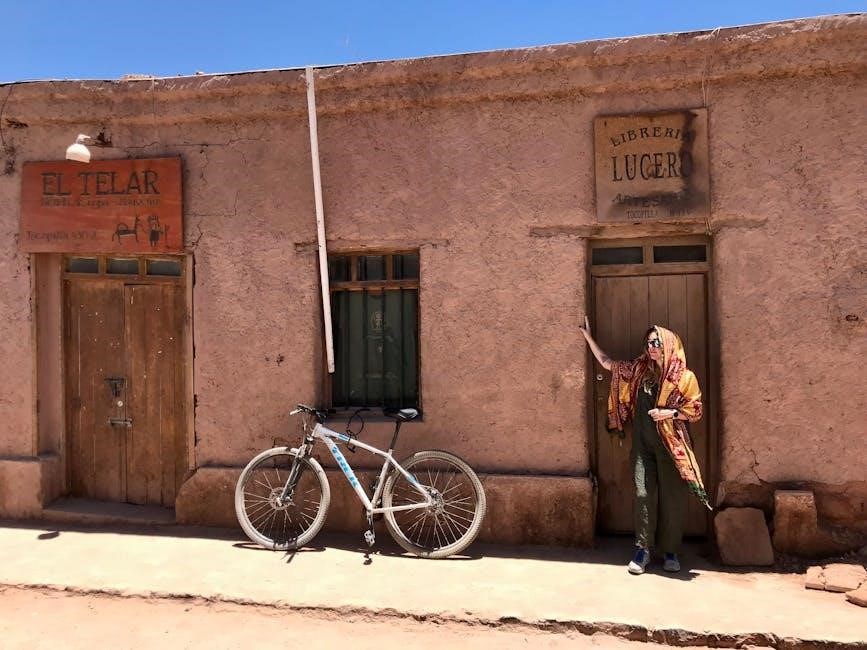Biography of Abou Fares el Dahdah
Abou Fares el Dahdah was a prominent Arabic scholar and educator, renowned for his contributions to language and culture. His works emphasize simplified learning and cultural preservation.
1.1 Early Life and Education
Abou Fares el Dahdah was born in 1864 in Lebanon, where he began his early education. He studied Arabic language and Islamic sciences under prominent scholars, developing a deep understanding of linguistics and cultural heritage. His education emphasized the importance of language as a tool for communication and cultural preservation. El Dahdah’s formative years laid the foundation for his later contributions to Arabic grammar and education. His early exposure to diverse intellectual influences shaped his approach to teaching and writing, making him a respected figure in the academic community. This period of his life was crucial in molding his philosophy and commitment to simplifying complex concepts for students. El Dahdah’s educational journey not only equipped him with knowledge but also instilled in him a passion for sharing it with others. His early life and education remain a testament to his dedication to learning and cultural enrichment.
1.2 Career and Contributions
Abou Fares el Dahdah’s career as a scholar and educator was marked by significant contributions to Arabic grammar and language teaching. He authored several influential works that simplified complex grammatical concepts, making them accessible to a broader audience. His publications, such as those referenced in the “Abou Fares el Dahdah PDF,” highlight his dedication to promoting linguistic understanding. El Dahdah’s approach emphasized creativity and independent thinking, encouraging students to engage deeply with the material. His contributions extended beyond academia, as he played a role in community development and cultural preservation. By creating educational resources that bridged theory and practice, he left a lasting impact on both students and scholars. His work continues to be celebrated for its clarity and effectiveness in teaching Arabic, ensuring his legacy endures in modern educational settings.
1.3 Personal Philosophy and Influences
Abou Fares el Dahdah’s personal philosophy revolved around the integration of cultural identity, spirituality, and social justice. He believed in the power of education to empower individuals and communities, emphasizing the importance of moral guidance and intellectual growth. His works reflect a deep respect for Arabic heritage while advocating for cross-cultural understanding. El Dahdah was influenced by the rich cultural and linguistic traditions of the Arab world, as well as global perspectives on education and social development. His approach to learning was holistic, aiming to nurture both the mind and the spirit. By blending traditional values with modern educational methods, he sought to create a balanced and inclusive framework for students. His philosophy continues to inspire educators and scholars, particularly through resources like the “Abou Fares el Dahdah PDF,” which encapsulates his vision for a more enlightened and equitable society.

Major Works by Abou Fares el Dahdah
Abou Fares el Dahdah authored influential grammatical works and educational resources, including the “Abou Fares el Dahdah PDF,” which simplifies Arabic language learning and promotes cultural understanding globally.
2.1 Grammatical Works and Publications
Abou Fares el Dahdah is celebrated for his groundbreaking grammatical works, which have significantly shaped Arabic language education. His publications, including the widely recognized “Abou Fares el Dahdah PDF,” provide comprehensive insights into Arabic grammar, making complex concepts accessible to learners of all levels. These resources emphasize practical application and cultural context, ensuring students not only master linguistic rules but also understand their relevance to Arab heritage. El Dahdah’s works are praised for their clarity and depth, catering to both native and non-native speakers. His approach has revolutionized language teaching, fostering a deeper appreciation for Arabic’s richness and versatility. The availability of his works in digital formats, such as PDFs, has further enhanced their accessibility, enabling global dissemination and adaptation in educational curricula.
2.2 Influence on Arabic Grammar and Language
Abou Fares el Dahdah’s works have profoundly influenced Arabic grammar and language, offering innovative approaches to understanding linguistic complexities. His publications, such as the “Abou Fares el Dahdah PDF,” simplify intricate grammatical rules, making them accessible to a broader audience. By integrating cultural context and practical applications, his resources have become indispensable for both native and non-native speakers. El Dahdah’s emphasis on clarity and depth has not only preserved Arabic linguistic heritage but also inspired modern educators to adopt his methods. His contributions have fostered a deeper appreciation for the richness of Arabic, ensuring its continued relevance in contemporary education and global cultural exchange. The widespread adoption of his materials underscores his enduring impact on the study and preservation of Arabic grammar and language.
2.3 Approach to Language Teaching
Abou Fares el Dahdah’s approach to language teaching emphasizes simplicity, accessibility, and cultural context. His methods, detailed in works like the “Abou Fares el Dahdah PDF,” focus on breaking down complex grammatical concepts into digestible lessons. By integrating practical examples and real-world applications, he encourages students to connect language learning with everyday communication. El Dahdah advocates for a student-centered approach, promoting creative and independent thinking. His resources are designed to accommodate learners of all levels, ensuring that even those with limited formal education can benefit. This inclusive philosophy has made his teaching materials widely adopted in educational settings, fostering a deeper understanding of Arabic language and culture. His approach not only equips students with linguistic skills but also inspires a lifelong appreciation for the cultural heritage embedded in the language.

Key Themes in Abou Fares el Dahdah’s Works
Abou Fares el Dahdah’s works explore themes of social justice, cultural identity, and spirituality, reflecting his commitment to moral guidance and community empowerment.
3.1 Social Justice and Advocacy
Abou Fares el Dahdah’s works prominently feature social justice and advocacy, emphasizing the need for equality and fairness in society. His writings often highlight the struggles of marginalized communities, urging collective action to address disparities. By integrating these themes into his educational materials, he aimed to inspire future generations to actively participate in creating a more just world. His approach not only educated students in language but also instilled values of compassion and responsibility. This dual focus on academic rigor and ethical awareness has made his works a cornerstone for those seeking to understand the intersections of education and social change. His legacy continues to motivate scholars and activists alike to advocate for human rights and societal reform.
3.2 Cultural Identity and Heritage
Abou Fares el Dahdah’s works are deeply rooted in the cultural identity and heritage of the Arab world. He emphasized the importance of preserving linguistic and cultural traditions, believing they form the foundation of a community’s identity. His writings often explore the rich history and contributions of Arabic civilization, inspiring readers to take pride in their heritage. By incorporating elements of Arab history and literature into his educational materials, he aimed to foster a sense of continuity and connection among generations. His efforts in promoting cultural awareness have made his works invaluable for understanding the Arab world’s historical and contemporary significance. This focus on cultural preservation ensures that his legacy endures as a vital resource for scholars and learners alike.
3.3 Spirituality and Moral Guidance
Abou Fares el Dahdah’s works often reflect his deep commitment to spirituality and moral guidance. He was known for integrating ethical and religious principles into his teachings, emphasizing the importance of faith in shaping individual and collective behavior. His writings frequently address themes of righteousness, compassion, and the pursuit of moral excellence. By blending spiritual insights with educational content, he aimed to nurture not only the intellect but also the character of his students. His approach encouraged learners to reflect on their values and responsibilities within a broader spiritual framework. This integration of morality and spirituality in his works has left a lasting impact on those who engage with his writings, fostering a holistic understanding of personal and societal growth. His legacy continues to inspire individuals seeking guidance in both their spiritual and academic journeys.
Educational Philosophy and Methods
Abou Fares el Dahdah’s educational philosophy centered on making learning accessible and engaging. He emphasized creativity, critical thinking, and cultural relevance, ensuring education was inclusive and meaningful for all students.
4.1 Emphasis on Language and Culture
Abou Fares el Dahdah’s educational approach strongly emphasized the integration of language and culture, viewing them as inseparable components of learning. He advocated for the use of language as a tool for cultural preservation and identity, particularly in the Arab world. His methods highlighted the importance of understanding cultural contexts to effectively communicate and connect with diverse communities. This philosophy was reflected in his support for programs designed to help refugees and migrant workers adapt to new environments through language acquisition. By focusing on cultural relevance, el Dahdah aimed to create a bridge between academic learning and real-world application, ensuring that students could engage meaningfully with their surroundings. His work aligns with institutions like the American Council on Education, which promotes accessible and inclusive education. This emphasis on language and culture remains a cornerstone of his legacy in modern educational frameworks.
4.2 Simplified Learning for All Students
Abou Fares el Dahdah championed a simplified approach to learning, ensuring accessibility for all students, regardless of their educational background. He believed in breaking down complex concepts into manageable parts, making knowledge attainable even for those with limited formal education. His methods emphasized clarity and practical application, avoiding unnecessary complexity. This approach was particularly beneficial for non-Arab migrant workers in Beirut, whom he supported through tailored educational programs. By focusing on essential skills and understanding, el Dahdah aimed to empower learners to navigate their environments effectively. His philosophy aligns with modern educational trends that prioritize inclusivity and adaptability, ensuring that no student is left behind in their academic journey.
El Dahdah’s simplified framework also incorporated tools like mnemonics and visual aids to enhance retention and engagement. This made his teachings highly effective across diverse learning settings, fostering a culture of accessible education for all.
4.3 Encouraging Creative and Independent Thinking
Abou Fares el Dahdah strongly advocated for fostering creativity and independent thinking in education. He believed that students should not merely memorize information but rather develop the ability to analyze and innovate. His teaching methods emphasized critical thinking, encouraging students to explore ideas and solutions independently. El Dahdah designed frameworks, such as the “Think Box” approach, to guide learners in systematically addressing problems while fostering originality. This method was particularly effective in helping students connect theoretical knowledge with practical applications. By promoting intellectual curiosity and creativity, el Dahdah aimed to prepare students for real-world challenges. His focus on independent thinking resonated with modern educational goals, inspiring learners to become adaptable and resourceful individuals capable of navigating complex situations with confidence and innovation.

Legacy and Impact on Arabic Literature
Abou Fares el Dahdah’s works have left a profound impact on Arabic literature, earning him recognition in academic circles and inspiring modern writers. His contributions to linguistic preservation and cultural heritage remain invaluable.
5.1 Recognition in Academic Circles
Abou Fares el Dahdah is highly regarded in academic circles for his scholarly contributions to Arabic grammar and language. His works are widely studied in universities, where they serve as foundational resources for understanding Arabic linguistics. His ability to simplify complex grammatical concepts has made his publications indispensable for students and researchers alike. The American University of Beirut and other institutions have recognized his efforts in promoting creative and independent thinking, aligning with their missions to foster intellectual growth. His writings, including the “Abou Fares el Dahdah PDF,” are celebrated for their clarity and depth, making them accessible to a broad audience. This recognition underscores his enduring influence on Arabic scholarship and education, solidifying his legacy as a leading figure in the field.
5.2 Enduring Influence on Modern Writers
Abou Fares el Dahdah’s works continue to inspire modern writers, offering a rich foundation for understanding Arabic grammar and cultural narratives. His publications, including the “Abou Fares el Dahdah PDF,” are celebrated for their clarity and depth, making them essential resources for both academic and creative writing. Many contemporary authors draw from his insights to craft compelling stories that reflect cultural identity and social justice themes. His emphasis on simplified learning has democratized access to Arabic scholarship, enabling writers to explore complex ideas with ease. By bridging tradition and modernity, el Dahdah’s legacy fosters a new generation of writers who value linguistic precision and cultural authenticity. His influence extends beyond academia, shaping creative expression and fostering cross-cultural understanding in literature.
5.3 Role in Preserving Linguistic Heritage
Abou Fares el Dahdah has played a pivotal role in preserving Arabic linguistic heritage through his scholarly works and educational efforts. His publications, including the “Abou Fares el Dahdah PDF,” serve as invaluable resources for understanding and promoting Arabic grammar and cultural identity. By simplifying complex linguistic concepts, he has made Arabic accessible to a broader audience, ensuring its survival and vibrancy in modern times. His work emphasizes the importance of language as a cornerstone of cultural heritage, inspiring future generations to appreciate and protect it. Through his contributions, el Dahdah has not only preserved linguistic traditions but also ensured their relevance in contemporary contexts, fostering a deeper connection to Arabic heritage worldwide.

The “Abou Fares el Dahdah PDF” Resource
The “Abou Fares el Dahdah PDF” is a comprehensive resource offering insights into Arabic grammar and cultural heritage. It serves as a valuable tool for scholars and learners alike.
6.1 Overview and Content
The “Abou Fares el Dahdah PDF” is a detailed compilation of his grammatical works, focusing on Arabic language and cultural preservation. It includes explanations of linguistic principles, practical exercises, and insights into cultural identity.
6.2 Availability and Accessibility
The “Abou Fares el Dahdah PDF” is widely available online, accessible through platforms like Scribd and academic repositories; Its digital format ensures ease of access for researchers and students globally.
6.3 Utilization in Educational Settings
The “Abou Fares el Dahdah PDF” serves as a valuable resource in educational environments, offering insights into Arabic grammar and cultural heritage. It is frequently used in language curricula to simplify Complex concepts, making it accessible to students of all levels. Educators often incorporate the resource to promote creative and independent thinking, aligning with Abou Fares’ emphasis on cultural preservation and linguistic clarity. Its availability in digital format allows for easy integration into online and offline learning platforms, benefiting both traditional and modern educational settings. Additionally, the resource supports cross-cultural understanding, enriching students’ awareness of Arabic traditions and values. This makes it a versatile tool for fostering both academic and cultural growth among learners worldwide.

Relevance in Modern Education and Research
Abou Fares el Dahdah’s works remain highly relevant in contemporary education, offering insights into Arabic grammar and cultural tourism. His PDF resources are widely used in modern language curricula and research.
7.1 Application in Contemporary Studies
Abou Fares el Dahdah’s works are widely applied in contemporary studies, particularly in language education and cultural research. His frameworks for storytelling and grammatical analysis provide students with practical tools for creative writing and linguistic understanding. Universities and educators often condense his teachings into accessible formats, enabling learners to grasp complex concepts efficiently. Additionally, his emphasis on cultural identity and social justice resonates with modern academic priorities, making his resources invaluable for interdisciplinary studies. The availability of his works in PDF formats has further enhanced their accessibility, allowing researchers and students worldwide to integrate his insights into diverse fields. This adaptability ensures his contributions remain relevant in addressing both academic and real-world challenges, fostering a deeper understanding of Arabic language and culture in contemporary contexts.
7.2 Use in Language Learning Curricula
Abou Fares el Dahdah’s works, particularly his grammatical publications, are increasingly integrated into language learning curricula worldwide. His PDF resources offer comprehensive insights into Arabic grammar, vocabulary, and cultural context, making them invaluable for both beginners and advanced learners. Educators appreciate the structured approach of his writings, which simplify complex linguistic concepts. The emphasis on cultural identity and heritage in his works aligns with modern language education goals, fostering a deeper understanding of Arabic culture. Additionally, his frameworks for storytelling and creative expression encourage learners to engage actively with the language, promoting fluency and confidence. As a result, his materials are widely adopted in academic institutions, supporting diverse language learning objectives and enriching curricula with a blend of tradition and contemporary relevance.
7.3 Contribution to Cultural Tourism and Awareness
Abou Fares el Dahdah’s works, particularly his PDF resources, contribute significantly to cultural tourism and awareness by showcasing Arabic cultural heritage. His writings highlight the richness of Arabic language, history, and traditions, attracting scholars and enthusiasts alike. By bridging cultural gaps, his works foster cross-cultural understanding, making Arabic culture more accessible globally. This exposure not only enhances tourism interest in regions like Lebanon but also promotes a deeper appreciation for Arab identity. His emphasis on storytelling and cultural preservation aligns with the growing demand for experiential and culturally immersive travel experiences. As a result, his resources serve as valuable tools for tourists and educators, enriching cultural awareness and inspiring global dialogue.

Cultural and Social Impact Beyond Academia
Abou Fares el Dahdah’s works extend beyond academia, influencing community development and cross-cultural understanding. His PDF resources promote social justice and cultural identity, fostering global dialogue and awareness of Arab heritage.
8.1 Influence on Community Development
Abou Fares el Dahdah’s work has significantly impacted community development by fostering cultural identity and social justice. His PDF resources emphasize empowerment through education, encouraging communities to preserve their heritage while embracing progress.
His teachings have been integrated into local programs, promoting unity and understanding among diverse groups. Additionally, his focus on language and culture has inspired initiatives that celebrate Arab heritage, bridging gaps between generations and fostering pride in cultural roots.
By advocating for accessible learning, he has enabled marginalized communities to engage with their history and traditions. This has led to stronger social bonds and a renewed commitment to collective advancement, making his work a cornerstone of community development efforts.
8.2 Role in Promoting Cross-Cultural Understanding
Abou Fares el Dahdah’s work has played a pivotal role in fostering cross-cultural understanding by bridging gaps between diverse communities. His PDF resources, designed to simplify language learning, have been used in various cultural contexts, including refugee education programs in Southeast Asia;
His emphasis on mutual respect and the importance of cultural exchange has inspired initiatives that bring people together across linguistic and cultural divides. By promoting Arabic language and heritage, he has encouraged dialogue and collaboration between Arab and non-Arab communities.
His approach to education, which values both tradition and modernity, has created a platform for shared learning and appreciation of different cultures. This has contributed significantly to global efforts in promoting tolerance and understanding in an increasingly interconnected world.
8.3 Engagement with Global Issues and Dialogue
Abou Fares el Dahdah’s work has significantly contributed to global dialogue by addressing pressing issues such as cultural preservation, education, and social justice. His PDF resources are widely used in educational settings, promoting cross-cultural exchange and fostering understanding of Arabic language and heritage.
His approach to language teaching emphasizes accessibility and simplicity, making it a valuable tool for diverse learners, including refugees and migrant workers. This has facilitated dialogue and collaboration across cultural boundaries, particularly in regions like Lebanon, where his work has inspired community development and cultural tourism initiatives.
By integrating traditional knowledge with modern educational methods, el Dahdah’s contributions encourage global engagement and address contemporary challenges. His legacy continues to inspire efforts in promoting cultural awareness and fostering inclusive dialogue worldwide.